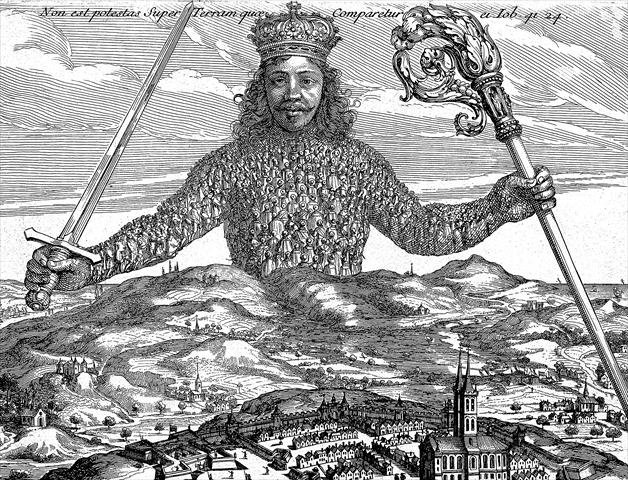Disclaimer: the Debate This!-series aims to promote civil and open discussion about philosophical and political ideas. Every Debate This!-post will start out with a premise (often an idea by a great historical thinker), on which I will provide my personal thoughts. I don’t pretend to have the right answers, but instead hope to learn and gain new insights from an honest debate in the comments below. Today’s premise is:
Government is a necessary evil - according to Thomas Hobbes

Thomas Hobbes (1588-1679) is often considered as the founder of modern political philosophy. His most famous and important work is Leviathan. In his magnum opus he (among other things) argues that a strong government is a necessity of a peaceful civil society. This government is represented by a sovereign who has absolute civil, judicial, military and even ecclesiastical powers.
Hobbes arrives at this conclusion in three steps, that build on each other:
State of nature
According to Hobbes all humans are created equal, but naturally don’t desire the same things. Since all men are ‘equal in faculties of body and mind’, everyone is naturally willing to fight one another to have their own self-interests fulfilled. Hobbes calls this the ‘war of all against all’.
In this state every man has a natural right to do anything what he sees fit to preserve his own life. As a result he becomes apolitical and asocial. There is no right or wrong, no good or bad. Since there are no laws, there can’t be any injustice.
But although humans don’t share the same desires, they do share the same fear: the summum malum or greatest evil, the fear of a violent death.
When man is in his state of nature however, this summum malum is always present. Or to put it in Hobbes’ own words:
“In such condition there is no place for industry, because the fruit thereof is uncertain, and consequently no culture of the earth, no navigation nor the use of commodities that may be imported by sea, no commodious building, no instruments of moving and removing such things as require much force, no knowledge of the face of the earth, no account of time, no arts, no letters, no society, and which is worst of all, continual fear and danger of violent death, and the life of man, solitary, poor, nasty, brutish, and short.”
So men want to avoid this state of nature and seek out to establish a social contract.
Social contract
The social contract is created when individuals come together and cede some of their individual rights so that others cede theirs. This ends the war of all against all and makes human life more peaceful.
For example, I cede my rights to kill you and use your possessions to fulfill my desires if you cede the same rights.
However, since men are naturally driven by their self-interests there is no guarantee that both parties will keep up their end of the deal.
For example, I say I agree to not kill you to make sure you won’t kill me, but still murder you in your sleep.
That’s why, according to Hobbes, ‘a terror of some power’ is necessary to keep up the social contract and make sure everyone abides by its rules.
The sovereign
This terror must be provided by an absolutist government with a sovereign at its head. Without it the social contract will cease to exist.
Therefore every man must give up his right to govern himself to this sovereign or else is doomed to live a ‘solitary, poor, nasty, brutish, and short’ life.
Personal thoughts
Although Hobbes’ arguments might seem logical at first, I think his whole theory is predicated on the idea that humans are naturally driven by their self-interests. If this isn’t the case, his whole argument falls apart.
So what about clear cases of altruistic behaviour? Hobbes would probably argue that these are fundamentally also driven by self-interest, but this seems like a far too simple explanation for such a complex phenomenon. Scientists of multiple fields have been studying altruism for ages, so to simply discard it as an extension of egoism seems faulty.
His argument that justice and morality can only exist where laws rule, also seems like an oversimplification. Especially in the light of modern moral philosophy and even biology: Levinas states that the primacy of ethics is derived from the encounter with and the acknowledgement of an other human being (‘the Other’). Nietzsche argues that master-slave morality is universal. And biologists are more and more convinced that morality is an evolutionary product.
What do you think by Hobbes’ ideas? Is a government necessary to have a peaceful civil society? Or is man simply to absorbed by his self-interests to naturally live in peace with each other?
Enjoyed this post? Feel free to upvote and follow @gamesjoyce !
You might also like:
"The unexamined life is not worth living." - Hello Steemit!
Net Neutrality in the US - Why it's in danger and how Steemians can help
